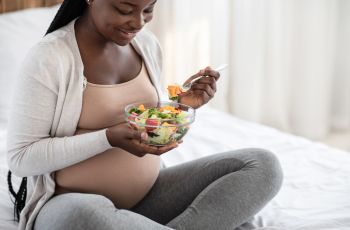WHAT ARE THE RISKS TO BREAST MILK COMPOSITION WHILST FOLLOWING A VEGAN DIET? by New Zealand nutritionist, Ingrid Mulder
Posted on
As vegan and vegetarian dietary patterns increase in popularity, it is important to consider the effects at all life cycle stages, in particular during breastfeeding. The nutritive compounds that make up breast milk are essential for normal development and growth of infants, but what if a mum is following a plant-based diet?
 Breastfeeding, we know, is both crucial for an infant and mother’s current and future health, as breast milk provides a unique combination of nutrients, growth factors, and immunological compounds to meet life cycle stage requirements.1 However, there is a very low rate of breastfeeding within the UK (about 34% with only 1% exclusively breastfeeding).2
Breastfeeding, we know, is both crucial for an infant and mother’s current and future health, as breast milk provides a unique combination of nutrients, growth factors, and immunological compounds to meet life cycle stage requirements.1 However, there is a very low rate of breastfeeding within the UK (about 34% with only 1% exclusively breastfeeding).2
We know too that exclusive breastfeeding for the first six months of life is associated with reduced infectious morbidity, respiratory infections, and middle ear infections.2 Although the composition of breast milk varies from mother to mother, healthcare professionals can still advise on lifestyle practices that result in safe breast milk compositions.
HOW DO VEGAN AND VEGETARIAN DIETS AFFECT BREAST MILK COMPOSITION?
It is tricky to examine a substance with such a cocktail of different components, but a systematic review by Karcz and Królak-Olejnik1 investigated non-nutritive and nutritive components. The non-nutritive components they found included:
- Brain-derived neurotrophic factor (BDNF)
- free nucleotides and nucleosides
- glutathione peroxidase activity
The nutritive components included:
- folic acid activity
- lactose
- selenium
- vitamin B12
- protein
- taurine
- total fat
- free fatty acids
 The review included 13 studies conducted between 1978 and 2018, with the main finding suggesting that a properly planned vegan diet can cover all nutrition needs. However, this is considering that vegans need to consume around 10% more protein to compensate for inadequate digestibility of plant-derived proteins.
The review included 13 studies conducted between 1978 and 2018, with the main finding suggesting that a properly planned vegan diet can cover all nutrition needs. However, this is considering that vegans need to consume around 10% more protein to compensate for inadequate digestibility of plant-derived proteins.
The authors noted the importance of supplementing with vitamin B12 and an omega-3 docosahexaenoic acid (DHA) supplementation. Both of these supplements are recommended among non-lactating vegan women anyway, so any risks of deficiencies in B12 and omega-3s from following a vegan or vegetarian diet whilst lactating are minimal.
FATTY ACIDS
Included in the systematic review was a cross-sectional study by Perrin et al.3 The authors specifically researched the fatty acid composition and BDNF levels within breast milk from those following a vegan diet, compared with breast milk from those on an omnivore diet. No differences were found in DHA and eicosapentaenoic acid (EPA) levels by diet group. Also, no difference was found in omega-6 levels between the diet groups, and, in fact, breast milk from vegan mothers had lower saturated fats and trans fats and higher unsaturated fats, including higher omega-3 levels.
These higher omega-3 levels were driven by higher alpha-linolenic acid (ALA) percentages. This suggests a beneficial effect of a vegan diet on breast milk lipid profile. Supplementation of DHA and EPA was also a good predictor of healthy fatty acids profiles, supporting the overall findings of the systematic review by Karcz and Królak-Olejnik.1
CHOLINE
Studies since this systematic review illustrate that breast milk choline levels, a nutrient commonly found in low levels in vegan diets, is also unaffected by a vegan diet. Choline is essential for phospholipid production and synthesis of the neurotransmitter acetylcholine, which is needed for muscle control, mood regulation, gene expression, and nervous system health among other things.
Perrin et al4 found no difference in free choline, phosphocholine and total breast milk choline concentrations in mothers following a vegan diet compared with vegetarians or omnivores. They did find, however, that water soluble glycerophosphocholine (GPC) concentration was significantly higher in vegans compared with other groups, but that meant that the percentage of choline coming from phosphocholine was also lower. Whist interesting, the biological significance of this percentage difference is unknown.
It is also worth noting that in this sample, only 41% of participants met the adequate intake (AI) for choline and there was no difference in prevalence of samples under the AI between dietary groups. So, despite the dietary pattern, people who breastfeed could benefit from increasing dietary sources of choline.
TAKE HOME MESSAGES:
- Vegan diets are becoming increasingly popular, making it more important for healthcare professionals to be aware of the health impacts at different life cycles.
- The rates of exclusive breastfeeding until six months is low in the UK, so it is crucial to be able to advise on safe dietary patterns during breastfeeding periods.
- Studies have found minimal difference in breast milk composition when comparing mothers following a vegan diet with mothers on a vegetarian or omnivore diet.
- Researchers emphasise the need for lactating women to supplement with the same supplements recommended for non-lactating vegan women. These supplements include vitamin B12 and DHA.
Ingrid Mulder, ANutr
Ingrid completed a BSc and MAppSc in Advanced Nutrition Practice in New Zealand,
with her main research area in climate-friendly and equitable diets.
Her publications focused specifically on the New Zealand food system.
She owns an online nutrition coaching business offering 1:1 sessions and
digital products: https://www.ingridmuldernutrition.com/
References
1 Karcz K and Królak-Olejnik B (2021). Vegan or vegetarian diet and breast milk composition – a systematic review. Crit Rev Food Sci Nutr, 61(7), 1081-1098. https://doi.org/10.1080/10408398.2020.1753650
2 Public Health England (2017). Health Matters: Child Oral Health. Retrieved 27th September from https://www.gov.uk/government/publications/breastfeeding-and-dental-health/breastfeeding-and-dental-health
3 Perrin MT, Pawlak R, Dean LL, Christis A and Friend L (2019). A cross-sectional study of fatty acids and brain-derived neurotrophic factor (BDNF) in human milk from lactating women following vegan, vegetarian and omnivore diets. Eur J Nutr, 58(6), 2401-2410. https://doi.org/10.1007/s00394-018-1793-z
4 Perrin MT, Pawlak R, Allen LH and Hampel D (2020). Total Water-Soluble Choline Concentration Does Not Differ in Milk from Vegan, Vegetarian, and Nonvegetarian Lactating Women. J Nutr, 150(3), 512-517. https://doi.org/10.1093/jn/nxz257
